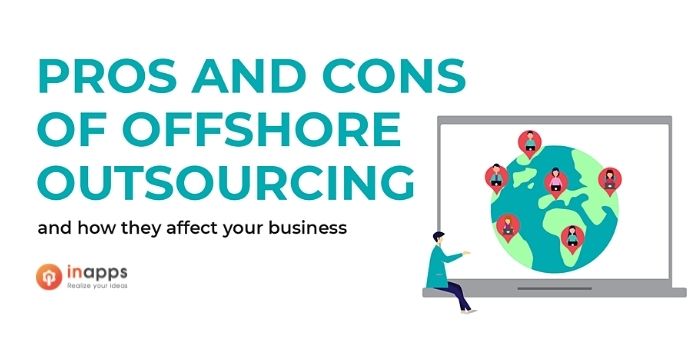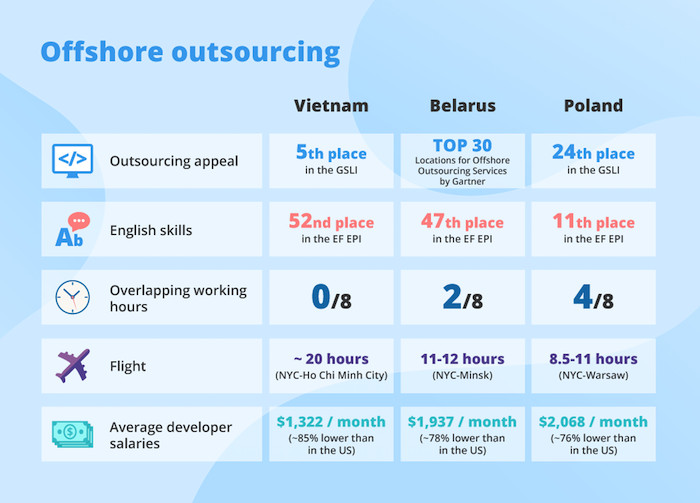- Home
- >
- Offshore News
- >
- OFFSHORE OUTSOURCING: FROM DEFINITION TO ACTUAL USE CASES
Sometimes it is not profitable to create your own IT department or hire extra developers to implement your project, so offshore outsourcing is an excellent opportunity to get professional services, including software development.
With so many types of offshore outsourcing companies, deciding which one to choose is not only challenging but can lead to even more confusion. This article will give you some assistance.

Outsource and Offshore
Types of outsourcing: practical difference
Suppose your company is based in Western Europe. Here is how we clarify the three main types of outsourcing:
- Local outsourcing (working with a company in your own country);
- Offshore outsourcing (finding a team somewhere in Asia, for example, in Vietnam);
- Nearshore outsourcing (choosing a company in a country not far from yours, like in Eastern Europe).
| Local
(Your country – Western Europe) |
Nearshore
(Eastern Europe) |
Offshore
(Asia) |
|
| Cost efficiency | – | – | + |
| Easy access | + | + | + |
| Small-time difference | + | + | – |
| Creativity | + | + | + |
| Cultural closeness | + | + | – |
| Benign environment | + | + | + |
| Sufficient labor market | – | – | + |
| Wide range of services | + | + | + |
What is Offshore Outsourcing?

offshoring pros and cons
Definition of Outsource and Offshore
Offshore outsourcing is the practice of hiring an external development company in an overseas location (Offshore) to perform specific tasks of the project or entire project as well as provide offshore dedicated developers (Outsourcing).
The most prevalent case of using this method is software development. Offshore outsourcing software development is a business approach for developing, delivering, and managing IT services at a cheaper cost.
This is generally accomplished by using the Internet to locate and shortlist service providers, then contacting and talking via email or phone. Once the outsourcer and the contractor have agreed, the contractor or service provider performs the agreed-upon services remotely.
Two main kinds of Offshore IT outsourcing
RESOURCE OUTSOURCING:
An offshore outsourcing company is an agent between a client company and highly-skilled developers. They look for specialists for functions that the client needs. This type is also called “outstaffing” or “staff augmentation”.
PROJECT OUTSOURCING:
Offshore outsourcing companies are frequently in charge of a project from start to finish and post-release maintenance.
Current and future effects of offshore outsourcing
Currently, 37% of businesses outsource to increase efficiency and expertise. The IT market is growing, and offshore IT outsourcing has become a standard business move.
Offshoring companies are now at the forefront of innovation. Their clients demand solutions that provide returns on investment rather than just cost savings, such as localization and compliance management, scalability, increased agility, and effective risk management.
Read more: Offshore software development – global population
Market needs for lower labor costs will most likely drive the sustained growth of offshore outsourcing. An increasing number of businesses are using this technique to focus on their primary business.
The most frequently used services are UI/UX design, Web and Mobile app development, QA software, dedicated team, etc.
Offshore Outsourcing Trends
- Strategic offshore partnership
- Expertise and flexibility over price
- The shift in an offshore location
- Mobile First
- Agile and Continuous Delivery
- Automation
- Experienced economy and consumer expectation
Offshore outsourcing pros and cons

Advantages and Disadvantages of offshoring
If you need short-term help for cheaper rates — outsourcing is the right step for your company. Everyone wants high-quality services, but no one wants to pay a high cost. Hence, outsourcing is the best opportunity to find relevant specialists at a reasonable price.
Now let’s weigh the pros and cons of offshore outsourcing.
Potential Advantages of IT offshore outsourcing
Why would businesses outsource services outside of their country? Read offshore software development benefits below now to understand why.
ACCESS TO A LARGER TALENT POOL
Hiring offshore developers gives you access to a diverse pool of talent from around the world, as well as cutting-edge technology, ensuring that project quality meets international standards.
COST REDUCTION UP TO 65%
Offshore development teams are generally from countries where the cost of hiring technically qualified labor is much less than the USA or Europe. So, even with the same number of skilled professionals in the team, the costs incurred are much less. When you can build software for less, you sell it for less; and it gives you a costing edge!
The offshore development center is thus a solution to substantial labor costs associated with recruitment, maintenance, and exit of the employees.
CONCENTRATION ON CORE BUSINESS
Benefits of offshore software development are to help you spend more time implementing your business plan and activities while offshore outsourcing software development businesses handle the project.
Disadvantages of IT offshore outsourcing
Offshore outsourcing allows businesses to cut expenses while gaining a competitive advantage in their respective fields. However, time zone differences, cultural barriers, and foreign regulations can cause challenges. Those are disadvantages of offshoring.
LANGUAGE BARRIER
While language and cultural barriers can impact the quality of service provided by the offshore development team, this gap can be closed through specialization and quality control.
The language barrier can be a big problem, make sure you have a team with good language skills to understand what you mean and carry out your plans accordingly. English is now the second language in most schools and universities in Vietnam. Chinese, Korean, Japanese, French are popular languages as well.
TIME ZONE DIFFERENCE
One of the biggest challenges with the offshore development team is working in vastly different time zones.
Working with overseas developers may necessitate making calls at inconvenient times to contact them during their regular working hours.
However, it can also be an advantage in some cases.
If you only have a local team, the midnight execution would require your team to work additional hours. But with an offshore team that has a decent time gap (i.e., 4-6 hours) that enables for some overlap but also has some working hours outside of your local time, you can address problems that arose at the end of your business day and work on them outside your business hours.
CONTROL AND MANAGEMENT
Because the offshore outsourcing software development business is not your in-house team, it’s challenging to keep track of every project detail to ensure that everything is running smoothly. If your organization provides project managers, they will take care of this for you.
Interactions may be hampered by a lack of face-to-face communication, time zones, and cultural barriers. You may avoid it by working with an offshore outsourcing software development business that is willing to work with your team on a flexible basis.
Popular Offshore Outsourcing Locations in Asia
Asia is the ‘tiger’ in the software outsourcing industry. Here are the key countries:
INDIA
India is prestigious as a redistributing economic goal with a massive pool of minimal-effort programming designers and developers. Other than the little expenses of $20 – $40 per hour, the Indian urban populace is additionally profoundly taught and semi-talented in up-and-coming specialized angles. Additionally, the country brags of a lively specialized foundation that has seen a lot of young people go to gain programming abilities to a propelled level.
VIETNAM
By 2020, Vietnam targets to enter the top 10 suppliers of software outsourcing and digital content globally with around one million workers in information and technology. The average developer salaries in Vietnam are approximately 85% lower than those in the United States, resulting in significant savings on your part. The typical offshore software development cost in Vietnam is $20 to $50.
CHINA
The region has a vast talent pool of competent developers. The cost of software development in China is somewhat more per hour than in other Asian nations: from $30 to50. This cost results from a more sophisticated local economy and skilled specialists susceptible to custom software development charges. One of the primary worries for firms considering outsourcing to China is the language barrier.
Learn more: Offshore Software Development Rates by Country – Detailed comparison
Top Offshore Outsourcing Companies in Vietnam
The Vietnamese IT outsourcing market is still in its early stages, but it is rapidly expanding: Vietnam has already surpassed Japan as the country’s second-largest IT outsourcing partner. By 2020, TopDev, a famous IT recruitment platform in Vietnam, expects to have 300,000 developer profiles registered.
Vietnam ranks fifth in the GSLI due to its meager labor rates, which compete with India’s, and favorable IT tax regulations. English skills vary, but if you’re willing to put in the effort, you’ll find a vendor whose communication level corresponds to your requirements.
The average developer salaries in Vietnam are approximately 85% lower than those in the United States, resulting in significant savings on your part.

Offshore Outsourceing
If you want to build a professional offshore software development team in Vietnam, look no further than InApps Technology! We’re proud to rank by Clutch as:
- Top Blockchain Developers in Vietnam
- Best Mobile App Development Companies in Vietnam
- Top E-Commerce App Developers in Vietnam
We provide offshore software development services to help clients increase their software development capacity and efficiently turn their ideas into working products. A dedicated Development Team of experienced engineers is to design and develop high-quality technical solutions of any level of complexity.
Reliability is one of the elements to make the best decision! Hence, we shall show you our reputation via Our Case Studies.
List of Keywords users find our article on Google:
[sociallocker id=”2721″]
| offshore outsourcing software development company |
| what is software outsourcing definition |
| software outsourcing definition |
| software offshore outsourcing |
| offshore outsourcing development |
| best offshore outsourcing |
| offshore outsourcing services |
| software services offshore outsourcing |
| offshore outsourcing software company |
| pros and cons of offshore software development |
| offshore it outsourcing company |
| what are offshore outsourcing services |
| offshore outsourcing definition |
| best offshore outsource companies |
| hiring offshore developers pros and cons |
| hire an offshore outsourcing |
| offshore outsource software development |
| offshore software outsourcing |
| it offshore outsourcing pros and cons |
| outsource software development offshore |
| wawa delivery |
| offshore it outsourcing companies |
| wawa jobs |
| offshore development center definition |
| offshore software development outsourcing |
| offshore software development meaning |
| the retail outsource |
| wawa menu |
| offshore outsourcing solutions |
| what is offshore development |
| nearshore outsourcing definition |
| пегас туристик |
| mobile app development company |
| “custom software development” |
| wawa hiring |
| offshore software outsourcing company |
| offshore it outsourcing services |
| wawa jobs near me |
| what organizations outsource and offshore |
| hire dedicated developers india |
| linkedin outsourced |
| pegas real |
| “wawa” |
| offshore development outsourcing |
| offshore software development outsourcing company |
| offshore applications meaning |
| offshore development center meaning |
| define offshore outsourcing |
| vietnam timezone |
| case western software center |
| outsourcing software development offshore |
| пегас турист |
| wawa pay rate |
| ui ux design vietnam |
| careers wawa |
| pegas touristik |
| youtube uitbesteden |
| work at wawa |
| offshore programming services |
| fintech app development cost |
| software engineering outsourcing |
| software development outsourcing |
| offshore clients |
| outsourcing solutions |
| mobile app development services |
| “nearshore developers” |
| “customer support outsource” |
| wawa.com linkedin |
| the retail outsource jobs |
| edtech customer support outsourcing |
| outsource short sale assistance services |
| overseas outsourcing definition |
| what does mvp mean in maintenance management software |
| outsource it near me |
| time difference vietnam |
| outsource el segundo |
| time difference in vietnam |
| outsource edtech customer service |
| qualee-technology |
| flatform means |
| outsourced offshore qa |
| пегас touristik |
| working at wawa |
| jobs wawa |
| outsource icon |
| the inconvenient indian listen |
| outsourcing icon |
| when is outsourcing the right move |
| mobility augmentation company |
| define software outsourcing |
| it outsourcing companies near me |
| facebook outsourcing |
| food service ux/ui |
| offshore outsourcing provider |
| best outsourcing locations |
| ux ui design vietnam |
| hire outsource employee from india |
| offshore ai developers |
| e commerce offshore vietnam |
| gtufc nehbcnbr |
| time zone vietnam |
| vietnam software developer |
| offshore software outsource |
| offshore jobs near me |
| offshore outsourcing projects |
| productivity press development team |
| dev staff offshoring |
| inconvenient definition |
| page outsourcing |
| ats vietnam |
| build an offshore team for ai |
| global software outsourcing market |
| nearshore offshore definition |
| offshore software development company |
| offshore outsourcing definition english |
| call center outsourcing market in europe |
| top software development company |
| top software development companies |
| app development companies near me |
| top mobile app development companies |
| app development near me |
| outsourcing software development to india |
| software development outsourcing companies in usa |
| recruitment saas |
| software development companies |
| sourcing definition |
| top software development companies in usa |
| software outsourcing services |
| offshore development company in india |
| profitable saas ideas |
| software development outsourcing company |
| ui ux developer |
| it outsourcing companies |
| software outsourcing companies in usa |
| software development firms |
| software development outsourcing services |
| hire dedicated app developers |
| it development outsourcing |
| custom software development companies |
| software development company |
| custom software development services india |
| hire dedicated developers india |
| custom software development company in india |
| outsourcing services group |
| minimum viable product development company |
| software development solutions |
| minimum viable product development services |
| ui ux services |
[/sociallocker]
Let’s create the next big thing together!
Coming together is a beginning. Keeping together is progress. Working together is success.



















